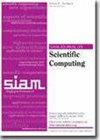Implicit-explicit Schemes for Incompressible Flow Problems with Variable Viscosity
IF 2.6
2区 数学
Q1 MATHEMATICS, APPLIED
引用次数: 0
Abstract
SIAM Journal on Scientific Computing, Volume 46, Issue 4, Page A2660-A2682, August 2024.Abstract. This article investigates different implicit-explicit (IMEX) methods for incompressible flows with variable viscosity. The viscosity field may depend on space and time alone or, for example, on velocity gradients. Unlike most previous works on IMEX schemes, which focus on the convective term, we propose also treating parts of the diffusive term explicitly, which can reduce the coupling between the velocity components. We present different IMEX alternatives for the variable-viscosity Navier–Stokes system, analyzing their theoretical and algorithmic properties. Temporal stability is proven for all the methods presented, including monolithic and fractional-step variants. These results are unconditional except for one of the fractional-step discretizations, whose stability is shown for time-step sizes under an upper bound that depends solely on the problem data. The key finding of this work is a class of IMEX schemes whose steps decouple the velocity components and are fully linearized (even if the viscosity depends nonlinearly on the velocity) without requiring any CFL condition for stability. Moreover, in the presence of Neumann boundaries, some of our formulations lead naturally to conditions involving normal pseudotractions. This generalizes to the variable-viscosity case what happens for the standard Laplacian form with constant viscosity. Our analysis is supported by a series of numerical experiments.
粘性可变的不可压缩流动问题的隐式-显式方案
SIAM 科学计算期刊》,第 46 卷第 4 期,第 A2660-A2682 页,2024 年 8 月。 摘要本文研究了粘性可变不可压缩流的不同隐式-显式(IMEX)方法。粘度场可能仅取决于空间和时间,也可能取决于速度梯度等。与以往大多数侧重于对流项的 IMEX 方案不同,我们建议同时显式处理部分扩散项,这样可以减少速度分量之间的耦合。我们针对变粘度 Navier-Stokes 系统提出了不同的 IMEX 替代方案,分析了它们的理论和算法特性。所介绍的所有方法,包括单步和分数步变体,都证明了时间稳定性。这些结果都是无条件的,只有一种分数步离散法例外,它的稳定性是在一个完全取决于问题数据的上限值下的时间步长。这项工作的关键发现是一类 IMEX 方案,其步骤与速度分量解耦并完全线性化(即使粘度非线性地依赖于速度),而不需要任何 CFL 稳定性条件。此外,在存在 Neumann 边界的情况下,我们的一些公式自然会引出涉及正常伪抽象的条件。这就把粘性恒定的标准拉普拉斯形式的情况推广到了粘性可变的情况。我们的分析得到了一系列数值实验的支持。
本文章由计算机程序翻译,如有差异,请以英文原文为准。
求助全文
约1分钟内获得全文
求助全文
来源期刊
CiteScore
5.50
自引率
3.20%
发文量
209
审稿时长
1 months
期刊介绍:
The purpose of SIAM Journal on Scientific Computing (SISC) is to advance computational methods for solving scientific and engineering problems.
SISC papers are classified into three categories:
1. Methods and Algorithms for Scientific Computing: Papers in this category may include theoretical analysis, provided that the relevance to applications in science and engineering is demonstrated. They should contain meaningful computational results and theoretical results or strong heuristics supporting the performance of new algorithms.
2. Computational Methods in Science and Engineering: Papers in this section will typically describe novel methodologies for solving a specific problem in computational science or engineering. They should contain enough information about the application to orient other computational scientists but should omit details of interest mainly to the applications specialist.
3. Software and High-Performance Computing: Papers in this category should concern the novel design and development of computational methods and high-quality software, parallel algorithms, high-performance computing issues, new architectures, data analysis, or visualization. The primary focus should be on computational methods that have potentially large impact for an important class of scientific or engineering problems.

 求助内容:
求助内容: 应助结果提醒方式:
应助结果提醒方式:


